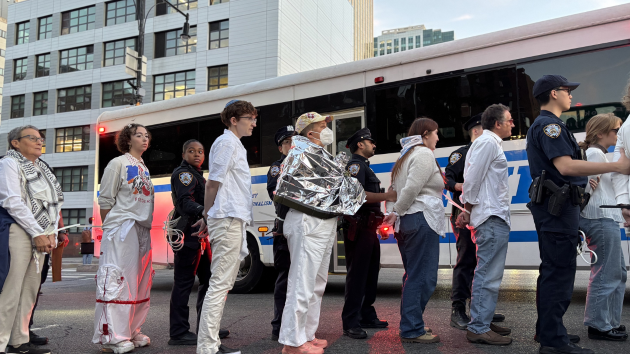EMT questioned in trial of two paramedics charged in connection with Elijah McClain’s death
Written by ABC Audio ALL RIGHTS RESERVED on December 2, 2023

(AURORA, Colo.) — One of the EMTs on the scene the night of Elijah McClain’s encounter with police was questioned Friday by the Colorado state attorney in the trial of the paramedics charged in connection with McClain’s death.
Jeremy Cooper and Peter Cichuniec were the Aurora Fire and Rescue paramedics who injected McClain with 500 milligrams of ketamine on Aug. 24, 2019, in Aurora, Colorado, after McClain was stopped by police.
Daniel DeJesus, one of the EMT firefighters on the scene that night with Cooper and Cichuniec, took the stand as the prosecution’s witness. DeJesus, who also was the scribe who jotted down the medical related notes on the scene, testified that his memory of that night was hazy when questioned by the state. But there were times when DeJesus was able to recollect events from the night.
“I was there for the whole scene, but I don’t recall that,” DeJesus said in his testimony on the stand when the prosecutor inquired if anyone had asked McClain how he was doing.
“Did anyone on the crew ask how could he be helped?” State Attorney Shannon Stevenson questioned.
“No, ma’am,” DeJesus replied.
Cooper and Cichuniec are charged with criminally negligent homicide, second-degree assault and crimes of violence. Cichuniec is facing an additional charge of manslaughter, according to the indictment. Cichuniec ordered the ketamine, and Cooper injected it into McClain. They have both pleaded not guilty.
“They intentionally injected Elijah McClain, who was laying on the ground, barely moving, struggling to breathe, with an overdose of ketamine without following a single step of their training and protocols,” Stevenson said in opening arguments. “They conducted no assessment. They didn’t speak a word to Elijah. They didn’t put a finger on him. And then they overdosed him with 150% of the dose someone his size should have gotten. And then they failed to even check on him until this pulse was gone. They knew better.”
DeJesus said that he assumed Cooper attempted to check McClain’s vitals before ketamine was administered, contradicting the prosecution’s argument that paramedics never seemed to attempt to check McClain’s vitals before injecting him with the sedative.
“I do recall that Cooper a couple of times trying to take a step forward,” DeJesus said of the paramedic when asked if he recalls anyone attempting to take McClain’s pulse. “It seems like he might have been cut off from looking at the [body camera] videos there and I would, from my opinion, say that he was attempting to get in there but not able to because he [McClain] was fighting and had handcuffs on.”
McClain was stopped by police on his way home from a convenience store after a passerby called 911 to report McClain as acting “sketchy” with a ski mask on, according to prosecutors. However, the caller said there was no weapon and that no one was in danger at the time.
Officer Nathan Woodyard, who was first on the scene, placed McClain in a carotid hold, and he and the other two officers on the scene moved McClain by force to the grass and restrained him, according to the indictment. McClain can be heard pleading with officers in police body camera footage, saying he couldn’t breathe.
Cichuniec and Cooper arrived on the scene after McClain was restrained and in handcuffs, according to the indictment.
McClain was declared brain-dead days later and died on Aug. 30, 2019.
Cooper and Cichuniec diagnosed McClain with excited delirium, after approximately two minutes on the scene, according to the indictment. Stevenson explained to the jury that the only time paramedics are allowed to administer ketamine is if the patient is suffering from excited delirium and is a danger to themselves and others.
McClain was handcuffed, held on the ground by multiple officers, and did not pose a threat to anyone, according to Stevenson. McClain weighed 143 pounds (65 kg) and as such his weight-based ketamine dose should have been closer to 325 mg of ketamine, rather than the 500 mg injected into the 23-year-old, Stevenson said.
McClain’s cause of death, which was previously listed as “undetermined,” was listed in an amended autopsy report as “complications of ketamine administration following forcible restraint.” The manner of death remained listed as “undetermined” as it was in the initial report.
During Woodyard’s trial, his defense attorneys argued the ketamine administered by the paramedics that night was responsible for McClain’s death. He was charged with manslaughter and criminally negligent homicide. Woodyard was acquitted by a jury on all charges last month and has since been reinstated to the Aurora Police Department under uniform-assignment restricted duty, according to police officials.
In the first trial in connection with McClain’s death, Officer Randy Roedema was found guilty on Oct. 12 of criminally negligent homicide and assault in the third degree. He will be sentenced in January 2024 and could face up to five years in prison and be fined more than $100,000. His employment with the police force was terminated following his conviction.
Another officer, Jason Rosenblatt, was found not guilty on charges of reckless manslaughter, assault in the second degree, and criminally negligent homicide in October. His employment with the police force was terminated in 2020.
The trial for Cichuniec and Cooper will be the last set of criminal charges to be tried by Colorado’s attorney general, according to an indictment.
Prosecutors mentioned that the fire medics had been notified that McClain had been vomiting before they arrived at the scene. One of the causes of McClain’s death, in addition to the ketamine, was forcible restraint, according to the autopsy. The prosecution is arguing that restraint caused McClain to vomit, which eventually obstructed his airway.
“No, nothing was done to check his airway,” DeJesus said when asked if any medics took action to clear his airway when they were told McClain had vomited. “No, there’s been no visual assessments.”
ABC News’ Aisha Frazier contributed to this report.
Copyright © 2023, ABC Audio. All rights reserved.

 KVSP
KVSP 




